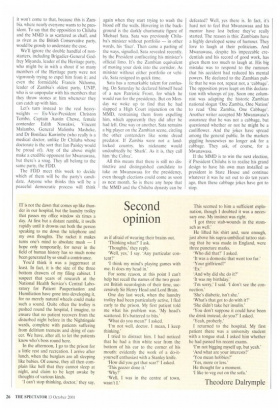Second opinion
IT is not the dawn that comes up like thunder in our hospital, but the laundry trolley that passes my office window six times a day. At first but a distant rumble, it swells rapidly until it drowns out both the person speaking to me down the telephone and my own thoughts. The racket it makes turns one's mind to absolute mush — I hope only temporarily, for never in the field of human history has so much noise been generated by so small a contrivance.
You'd think it was a juggernaut at least. In fact, it is the size of the three bottom drawers of my filing cabinet. I suspect that years of research at the National Health Service's Central Laboratory for Patient Pauperisation and Humiliation have gone into developing it, for no merely natural wheels could make such a sound. Quite often the trolley is pushed round the hospital, I imagine, to ensure that no patient recovers from the disturbed night before in the Nightingale wards, complete with patients suffering from delirium tremens and dying of cancer. We have, after all, to let the patients know who's boss round here.
In the afternoon, I go to the prison for a little rest and recreation. I arrive after lunch, when the burglars are all sleeping like babies. Of course, they all then complain like hell that they cannot sleep at night, and claim to be kept awake by thoughts of various kinds.
'I can't stop thinking, doctor,' they say,
as if afraid of wearing their brains out. 'Thinking what?' I ask.
'Thoughts,' they reply.
'Well, yes,' I say. 'Any particular content?'
'I think my mind's playing games with me. It does my head in.'
For some reason, at this point I can't help but recall the names of the two greatest British neurologists of their time, successively Sir Henry Head and Lord Brain.
One day last week, when the laundry trolley had been particularly active, I fled early to the prison. My first patient told me what his problem was. 'My head's scattered. It's battered to bits.'
'What do you mean?' I asked.
'I'm not well, doctor. I mean, I keep thinking.'
I tried to distract him. I had noticed that he had a thin white scar from the bottom of his ear to the corner of his mouth: evidently the work of a do-ityourself enthusiast with a Stanley knife.
'How did you get that scar?' I asked.
'This geezer done it.'
'Why?'
'Well, I was in the centre of town, wasn't I.' This seemed to him a sufficient explanation, though I doubted it was a necessary one. My instinct was right.
'I got three stab-wounds in the stomach as well.'
He lifted his shirt and, sure enough, just above his supra-umbilical tattoo stating that he was made in England, were three puncture marks.
'Who did that?' I asked.
'It was a domestic that went too far.'
'Your girlfriend?' ,Ex.,
'And why did she do it?'
'It was my birthday.'
`I'm sorry,' I said. 'I don't see the con nection.'
'She's diabetic, isn't she.'
'What's that got to do with it?'
'She didn't take her insulin.'
'You don't suppose it could have been the drink instead, do you?' I asked.
'Yeah, proberly.'
I returned to the hospital. My first patient there was a university student with a tongue stud. I asked him whether he had passed his recent exams.
'I'm not bigging myself up, but yeah.'
'And what are your interests?'
'You mean hobbies?'
'Yes, more or less.'
He thought for a moment.
'I like to veg out on the sofa.'
Theodore Dalrymple


























































































 Previous page
Previous page